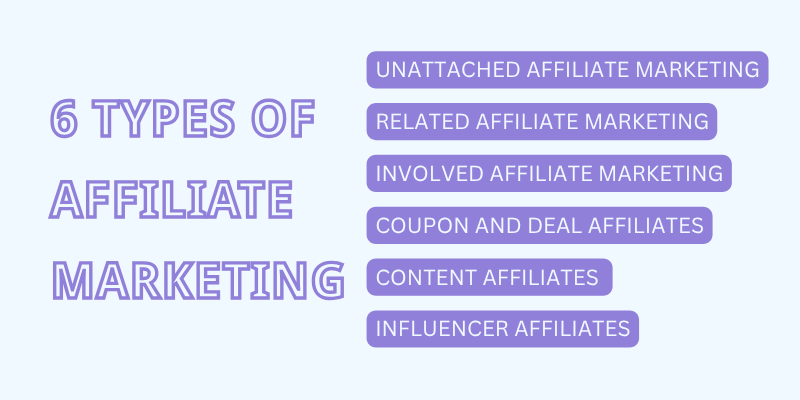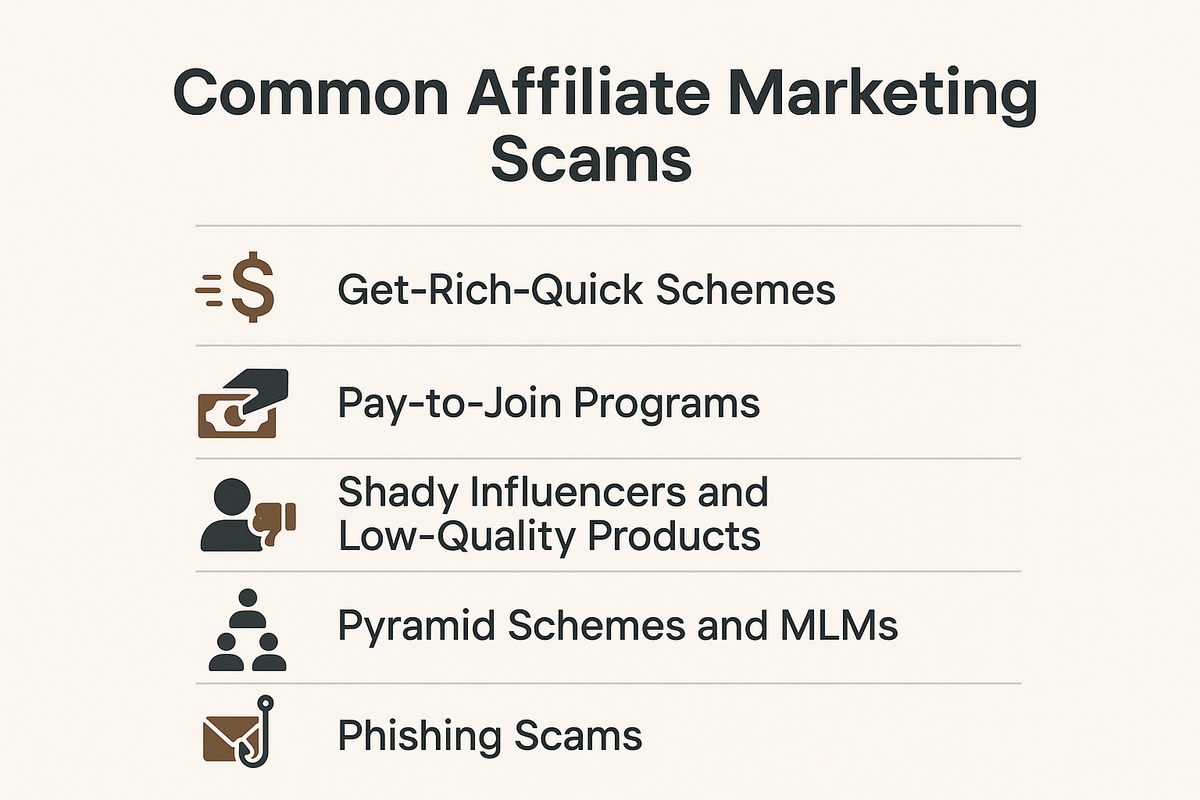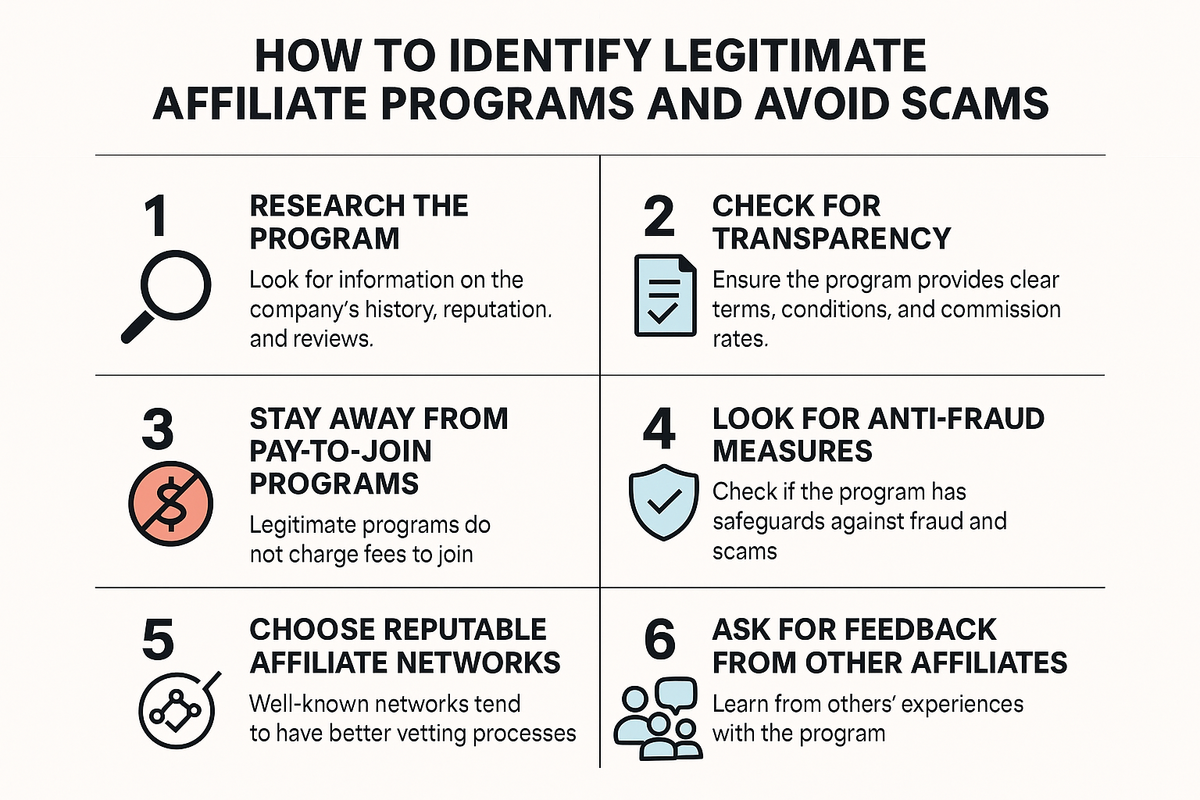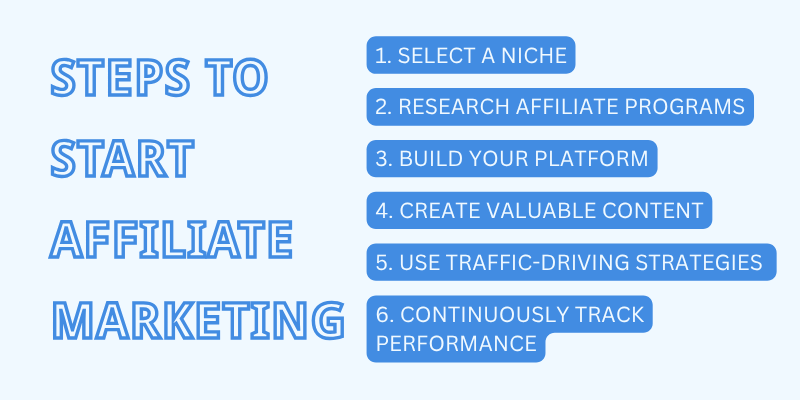With the rise of bloggers, influencers, and online businesses, affiliate marketing has become one of the most popular income-generating strategies.
But, is affiliate marketing legit? While some question its legitimacy due to scams disguised as affiliate programs, at its core, affiliate marketing is a performance-driven, transparent model used by some of the world’s most reputable companies.
So, is this booming industry everyone’s talking about worth your time?
This guide explores whether affiliate marketing is truly legit, how it works, and what to watch out for if you're considering stepping into this space.
What Is Affiliate Marketing?
Affiliate marketing is a performance-based marketing model where individuals or businesses, known as affiliates, promote products or services on behalf of a merchant in exchange for a commission on resulting sales or leads.
Affiliates share unique tracking links that identify their referrals, ensuring they get credited for any successful conversions.
This marketing approach is especially common across e-commerce marketing platforms, digital products, subscription services, and online courses, allowing merchants to extend their reach through a network of motivated promoters without upfront advertising costs.
6 Types of Affiliate Marketing
Affiliate marketing comes in several forms, each varying by the level of involvement and the relationship the affiliate has with the promoted product or audience.

1. Unattached Affiliate Marketing
It is the most basic form, where affiliates have no direct connection to the product or audience. They promote products purely through ads or paid channels without personal endorsement or expertise. While easier to start, it often results in lower trust and conversion rates.
2. Related Affiliate Marketing
It involves affiliates promoting products that align with their niche or audience interests, even if they don’t use the products themselves.
For example, a B2B Marketing affiliate recommending software tools fits this model. Affiliates build some authority by focusing on relevant products, which can improve engagement. This approach tends to create a more genuine connection with the audience, leading to better conversions.
3. Involved in Affiliate Marketing
It is the most authentic type, where affiliates personally use and endorse the product or service. This hands-on experience builds credibility and trust with their audience, often leading to higher conversion rates. Reviews, tutorials, and testimonials are common here.
4. Coupon and Deal Affiliates
It focuses on sharing discount codes, special offers, or promotions to entice buyers. They often run coupon websites or newsletters, attracting bargain hunters looking for savings.
5. Content Affiliates
It involves valuable content creation, such as blog posts, videos, or podcasts that educate or entertain while integrating affiliate links naturally. This approach relies heavily on quality content to drive conversions. This approach relies heavily on quality content to drive conversions.
For example, a content affiliate might use engaging Digital Marketing Collaterals like educational videos or detailed blog posts to seamlessly introduce affiliate links, educating their audience about products they genuinely believe in.
6. Influencer Affiliates
It leverages the social media presence and follower trust to promote products. Influencers often blend personal recommendations with sponsored content, benefiting from their large, engaged audiences.
Each type offers unique advantages and challenges, allowing marketers to choose the best fit for their style and goals.
How Does Affiliate Marketing Work?
The affiliate marketing process begins when an individual or business joins an affiliate program or network that offers products or services to promote.
Once accepted, the affiliate receives unique tracking links or codes to share across various channels such as blogs, social media platforms, email campaigns, or paid advertisements. Digital Transformation Services are often incorporated to streamline and optimize the affiliate marketing process, ensuring that affiliates can effectively promote products through advanced technology and analytics.
To track the effectiveness of these efforts, it's crucial to understand what is the digital marketing strategy that tracks users across the web? The strategy employed allows for better personalization and targeted promotions.
Additionally, using techniques like Google keyword ranking helps affiliates optimize content to appear higher on top search engines, driving more organic traffic to their affiliate links.
When a potential customer clicks on these links and completes a purchase or a specific action, the affiliate program tracks this activity, typically using cookies or unique URLs to attribute the sale to the affiliate.
The affiliate earns a commission based on the agreed terms, making the entire system performance-driven and measurable.
Is Affiliate Marketing Legitimate?
Affiliate marketing is widely recognized as a legitimate business model, largely because it is adopted by some of the world’s most reputable companies, including Amazon, Shopify, and countless others.
These companies maintain transparent commission structures with clearly defined terms, ensuring affiliates understand how and when they will be compensated.
Importantly, affiliates earn commissions only when genuine sales or qualified leads occur, which aligns incentives and promotes fairness.
Additionally, affiliate marketing operates within legal frameworks and is regulated in many countries, with guidelines to protect both consumers and marketers, further reinforcing its legitimacy.
In the ever-changing landscape of digital marketing, the ability to track performance and increase conversion rate is essential to maintaining success, especially as marketing growth continues to evolve with the rise of AI and automation.
Common Challenges in Affiliate Marketing
Despite its potential, affiliate marketing comes with several challenges that affiliates must navigate. One major hurdle is high competition, as many affiliates often promote the same products, making it difficult to differentiate and capture the audience’s attention. eCommerce Marketing can often amplify this competition, as many merchants rely on affiliate networks to promote their products across multiple channels.
Building trust with your audience is another essential yet time-consuming task, requiring consistent, honest content and engagement.
Generating enough targeted traffic to convert into sales can also be challenging, especially for beginners without established platforms. Affiliates may face issues when merchants change commission structures unexpectedly, reducing payout rates or altering terms. In addition, some affiliates seek solutions like white label local SEO services to boost visibility in search engines, though this can be another layer of complexity.
Tracking problems can occur, too, where sales or clicks may not be properly recorded, leading to disputes over commissions.
Affiliates must stay compliant with advertising laws and disclosure requirements, which can be complex and vary by region.
Since affiliate income depends on the merchant’s stability and ongoing program support, any disruption on the merchant’s side can directly impact affiliate earnings.
How to Track and Measure Affiliate Performance?
Tracking and measuring affiliate performance is essential to understand the effectiveness of your marketing efforts and optimize your strategies. Digital Marketing can help you implement efficient tracking methods and tools that ensure accurate data collection and analysis.

- Use unique tracking links to monitor clicks, conversions, and sales generated by each affiliate.
- Implement cookies to track user activity over time and credit affiliates for delayed purchases.
- Monitor key performance metrics such as clicks, conversion rates, total sales, and commissions earned.
- Utilize affiliate dashboards and analytics tools for real-time performance tracking and insights.
- Integrate Google Analytics to set up goal tracking and analyze affiliate-driven traffic and user behavior.
- Detect and prevent fraudulent activities like fake clicks or false conversions to ensure accurate reporting and fair payouts.
- Continuously analyze data to optimize campaigns and improve affiliate marketing ROI
Explore Our Digital Marketing Services!
5 Common Affiliate Marketing Scams
Before diving into affiliate marketing, it’s essential to know the risks involved and how to avoid scams. Let’s examine some of the most common scams that may make you question whether affiliate marketing is real or is affiliate marketing safe.

1. Get-Rich-Quick Schemes
Many scammers prey on the desire to make easy money, promising huge earnings with minimal effort. These offers often sound too good to be true. If something seems too good to be true, it probably is.
A legitimate affiliate program will offer clear guidelines on how to earn commissions and will set realistic expectations about potential earnings. Stay away from programs that guarantee fast riches without any explanation of the work involved.
2. Pay-to-Join Programs
You may come across affiliate marketing programs that ask for an upfront payment to join. These types of programs often promote the idea of exclusive tools, training, or high commissions in exchange for an initial fee.
However, these programs frequently focus on recruiting others to pay for membership, rather than selling actual products or services. This structure is a clear sign of a pyramid scheme or MLM (multi-level marketing), which is not a legitimate affiliate program.
3. Shady Influencers and Low-Quality Products
Some affiliate marketers may find themselves promoting subpar or fraudulent products, often sold by fake influencers or so-called “gurus.” These individuals claim to offer top-notch training or courses but fail to deliver on their promises.
These scammers typically don’t track your leads properly or refuse to pay commissions on your efforts. If you're concerned about whether affiliate programs are legit, it's vital to ensure the products and influencers you're promoting are credible.
4. Pyramid Schemes and MLMs
Pyramid schemes and MLMs often masquerade as legitimate affiliate marketing opportunities. In these scams, you earn money primarily by recruiting others rather than selling actual products. Those at the top of the pyramid earn the most, while others often lose their money.
It’s important to remember that affiliate marketing is legitimate when the focus is on selling quality products or services, not just recruitment.
5. Phishing Scams
Phishing is a serious threat in the affiliate marketing world. Scammers will send fake emails that mimic legitimate affiliate platforms to steal your sensitive information, such as passwords or credit card numbers.
These emails often appear to come from reputable companies and may even ask you to update your payment information or reset your password. Is affiliate marketing safe? When working with established platforms and paying attention to red flags, it’s generally secure. Always verify the sender’s email and avoid clicking suspicious links.
How to Identify Legitimate Affiliate Programs and Avoid Scams?
Despite the risks, affiliate marketing is legitimate when done correctly. Here are some tips to ensure you’re engaging with reputable affiliate programs and marketers:

1. Research the Program
Before joining any affiliate program, research the company behind it. Look for customer reviews, testimonials, and program details. If something feels off, it's best to avoid it.
2. Check for Transparency
A legitimate affiliate program will provide clear, transparent information about the commission structure, payment schedules, and terms. If the program doesn’t share this information upfront, consider it a red flag.
3. Stay Away from Pay-to-Join Programs
Most legitimate affiliate programs do not require an upfront fee to join. If a program demands payment to participate, it’s probably a scam.
4. Look for Anti-Fraud Measures
Check if the affiliate program has an anti-fraud policy. Reputable programs often implement fraud detection systems to prevent scams and protect both affiliates and businesses.
5. Choose Reputable Affiliate Networks
Platforms like Amazon Associates, ClickBank, and Rakuten Marketing are well-known and offer trustworthy affiliate programs. Look for long-standing programs with positive reviews and proven track records.
6. Ask for Feedback from Other Affiliates
Join affiliate marketing forums and communities to ask about the program you’re considering. Hearing from experienced affiliates can help you avoid scams.
5 Legal Considerations in Affiliate Marketing
Affiliate marketing, while lucrative, comes with important legal responsibilities that affiliates must understand to operate ethically and avoid penalties.
Here are the main legal considerations:
1. Disclosure Requirements
In many countries, including the United States, the Federal Trade Commission (FTC) mandates that affiliates clearly disclose their relationship with merchants when promoting products.
2. Compliance with broader advertising and marketing laws
Affiliates must avoid making false claims or deceptive statements about the products they promote. Misleading endorsements can result in legal action and damage to reputation. Ensuring honesty in promotional content protects both consumers and marketers.
3. Data privacy laws, such as the General Data Protection Regulation (GDPR)
In Europe and the California Consumer Privacy Act (CCPA) in the U.S., the law impacts how affiliates collect and use data. Proper consent must be obtained for tracking cookies and any personal data collection. Affiliates must also respect users’ rights regarding data access and deletion.
4. Respect for intellectual property is essential
Affiliates should only use brand logos, trademarks, or copyrighted materials with permission. Unauthorized use can lead to legal disputes and termination from affiliate programs.
5. Affiliates must avoid spamming and misleading claims
In emails, social media, or other communications. Adhering to anti-spam laws, such as the CAN-SPAM Act, helps maintain program integrity and builds positive relationships with audiences.
Understanding and following these legal considerations is vital for long-term success and credibility in affiliate marketing.
How to Get Started as an Affiliate Marketer?
Starting as an affiliate marketer begins with choosing a niche that matches your interests and researching trustworthy affiliate programs.

Build your platform by creating honest, valuable content and using SEO services, social media, and email marketing to drive targeted traffic and grow your audience.
- Select a niche that aligns with your interests, knowledge, or passion to create relevant and authentic content.
- Research reputable affiliate programs and networks offering fair commissions, reliable tracking, and quality products (e.g., Amazon Associates, ShareASale, ClickBank).
- Build your platform blog, YouTube channel, podcast, or social media profile to share content and engage your audience consistently.
- Valuable and honest content creation, such as product reviews, tutorials, or educational posts, helps your audience make informed decisions.
- Use traffic-driving strategies like SEO, social media marketing, and email marketing campaigns to reach a broader, targeted audience.
- Continuously track performance using affiliate dashboards and analytics tools to identify effective campaigns and optimize for growth.
6 Future Trends in Affiliate Marketing
Affiliate marketing is evolving rapidly, driven by technological advancements and changing consumer behaviors.
- Rise of AI and automation to optimize targeting, personalize content, and automate tasks.
- Growth of influencer-driven affiliate promotions blending authentic recommendations with sponsorships.
- Increasing focus on mobile-first strategies as smartphone usage dominates online traffic.
- Optimization for voice search to capture traffic from smart assistants and voice queries.
- Stronger emphasis on authenticity and user experience to build trust and engagement.
- Expansion into emerging markets and innovative platforms like live streaming and social commerce.
For those looking to stay ahead of the curve, utilizing Centric, a digital transformation agency, can help implement cutting-edge technologies and strategies to elevate affiliate marketing efforts.
As these trends evolve, businesses relying on affiliate marketing also need robust online presences, which is where websites Development services come in, ensuring that their platforms are optimized for all these new trends and provide seamless user experiences.
FAQs: Is Affiliate Marketing Legit?
Is Affiliate Marketing Easy to Start?
Affiliate marketing is relatively easy to begin because it doesn’t require product creation or inventory management. However, building a successful affiliate business takes time, learning, and consistent effort.
How Much Can I Realistically Earn?
Earnings vary widely depending on niche, effort, and strategy. Some affiliates make a few hundred dollars monthly, while top performers earn thousands or even six figures. Patience and continuous optimization are key.
Do I Need a Website To Be An Affiliate?
While having a website or blog helps build credibility and organic traffic, it’s not mandatory. Many affiliates use social media platforms, YouTube channels, or email lists to promote products successfully.
Can I Join Multiple Affiliate Programs?
Yes, you can join multiple programs, but it’s best to focus on products that align with your niche and audience to maintain authenticity and effectiveness. Additionally, some affiliates leverage tools like mobile SEO services to optimize their websites for mobile devices, improving user experience and search rankings.
What are the Best Affiliate Networks for Beginners?
Popular beginner-friendly networks include Amazon Associates, ShareASale, ClickBank, and CJ Affiliate. These offer a wide range of products, easy sign-up, and good support to help you get started. Starting with a network offering eCommerce SEO tools can help boost visibility in affiliate campaigns.
Conclusion
Affiliate marketing is a proven and legitimate way to earn income online, supported by reputable companies and transparent business models. So, is affiliate marketing legit? Yes, it offers valuable opportunities for individuals to build sustainable income streams by promoting products they believe in. However, success in affiliate marketing requires thorough research, consistent effort, and adherence to ethical practices. In this competitive landscape, partnering with agencies like Centric, can provide essential insights and strategies to help you excel. They can offer guidance on effective affiliate marketing tactics, helping you avoid common pitfalls and focusing on authentic content. This, in turn, helps build long-term trust with your audience, which is crucial for conversions.
Avoiding scams and focusing on authentic content helps build long-term trust with your audience, which is crucial for conversions. Patience is equally important, as results rarely come overnight, but steady work can lead to significant rewards. Approaching affiliate marketing with realistic expectations and a strategic mindset increases your chances of success. Ultimately, with the right approach, affiliate marketing can be a reliable and scalable source of income that complements a variety of personal and professional goals.









